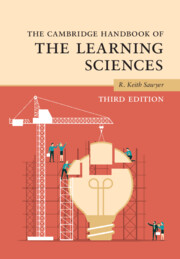Book contents
- The Cambridge Handbook of the Learning Sciences
- The Cambridge Handbook of the Learning Sciences
- Copyright page
- Contents
- Figures
- Tables
- Contributors
- Preface
- 1 An Introduction to the Learning Sciences
- Part I Foundations
- 2 Foundations of the Learning Sciences
- 3 Scaffolding
- 4 Project-Based Learning
- 5 Metacognition and Self-Regulated Learning
- 6 A History of Conceptual Change Research
- 7 Learning in Activity
- 8 Cognitive Apprenticeship
- Part II Methodologies
- Part III Grounding Technology in the Learning Sciences
- Part IV Learning Together
- Part V Learning Disciplinary Knowledge
- Part VI Moving Learning Sciences Research into the Classroom
- Index
- References
5 - Metacognition and Self-Regulated Learning
from Part I - Foundations
Published online by Cambridge University Press: 14 March 2022
- The Cambridge Handbook of the Learning Sciences
- The Cambridge Handbook of the Learning Sciences
- Copyright page
- Contents
- Figures
- Tables
- Contributors
- Preface
- 1 An Introduction to the Learning Sciences
- Part I Foundations
- 2 Foundations of the Learning Sciences
- 3 Scaffolding
- 4 Project-Based Learning
- 5 Metacognition and Self-Regulated Learning
- 6 A History of Conceptual Change Research
- 7 Learning in Activity
- 8 Cognitive Apprenticeship
- Part II Methodologies
- Part III Grounding Technology in the Learning Sciences
- Part IV Learning Together
- Part V Learning Disciplinary Knowledge
- Part VI Moving Learning Sciences Research into the Classroom
- Index
- References
Summary
Metacognition is thinking about the contents and processes of one’s own cognition. Research shows that metacognition plays important roles in most cognitive tasks, from everyday behaviors to problem-solving to expert performance. This chapter focuses on metacognition’s centrality in learning and in self-regulated learning. When learning, people monitor what they know and whether it is aligned with their intended learning outcome. A learner’s ability to monitor effectively is known as calibration. Learners then control their next actions based on their monitoring, and finally they self-regulate the process of monitoring and controlling their learning by shaping and adapting cognition or behavior by reaching forward by planning for future tasks. Research shows that people learn better when they have strong metacognitive abilities and when they can self-regulate their learning effectively.
- Type
- Chapter
- Information
- The Cambridge Handbook of the Learning Sciences , pp. 93 - 113Publisher: Cambridge University PressPrint publication year: 2022
References
- 21
- Cited by

